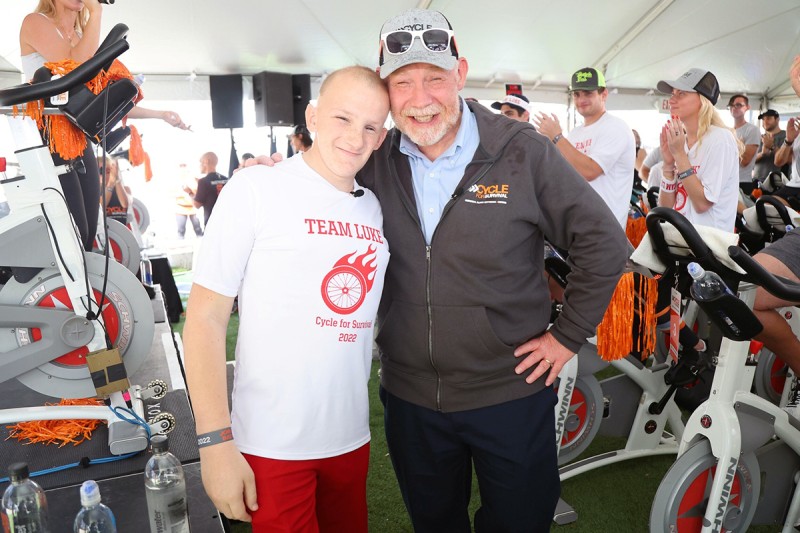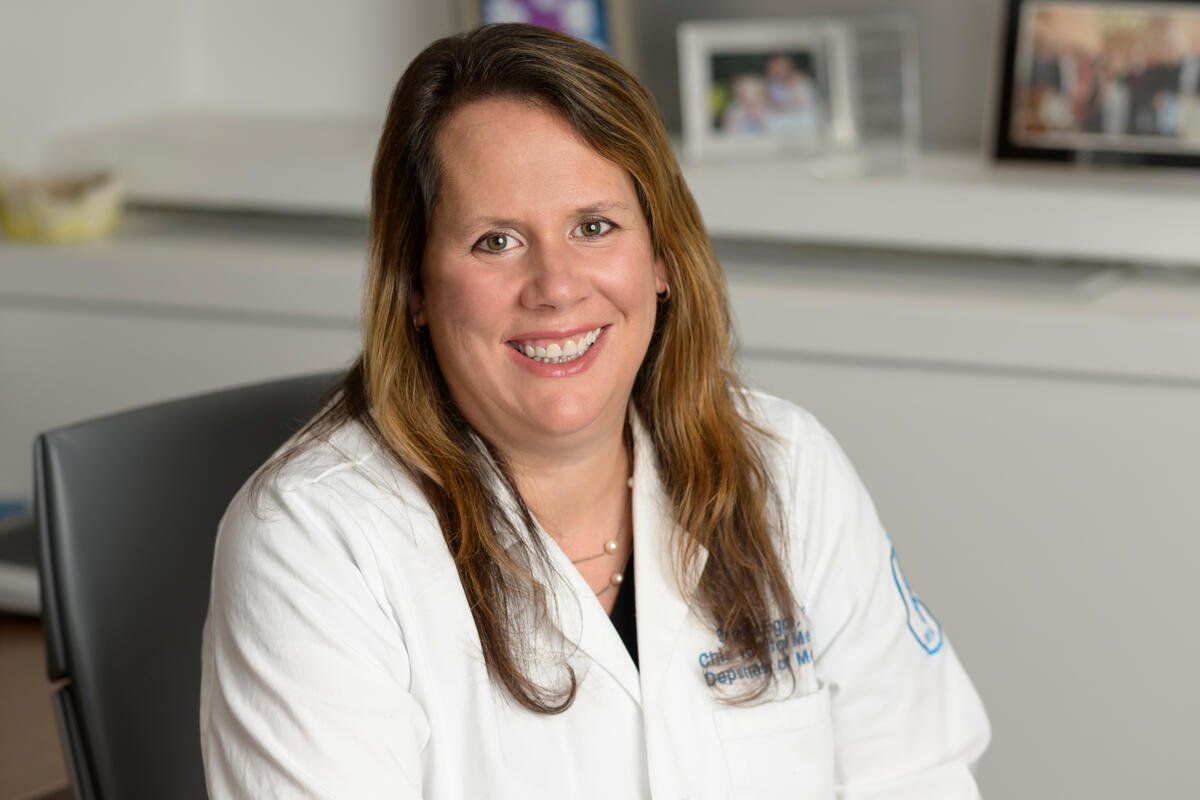
Luke Weber, left, helped inspire the sleep initiative by speaking about his patient experience at a meeting of the Patient and Family Advisory Council for Quality. Seen here with his MSK physician, Dr. Leonard Wexler, Luke also has long been a champion for Cycle for Survival, which raises money for rare cancer research.
The constant beeping of machines. The frequent middle-of-the-night interruptions for blood draws and blood pressure checks. These are some of Luke Weber’s most vivid memories of being a 9-year-old getting treated for a rare pediatric cancer at MSK Kids.
“It felt like they were always coming in when I didn’t want them to — and not coming in when I didn’t mind,” he remembers. “Why not come when I’m awake during the day, when I’m not doing anything? It’s not like I’ve got a packed schedule.”
Now age 22 and cancer free, Luke realizes that patients need careful monitoring. And he is profoundly grateful for his care at Memorial Sloan Kettering Cancer Center, which was led by pediatric oncologist Leonard H. Wexler, MD.
But he always wondered if there could be a better approach for patients craving a good night’s sleep. When he was 15, he spoke at a meeting of MSK’s Patient and Family Advisory Council for Quality (PFACQ), which seeks to improve the patient experience.
His mother, Eliza Weber, was a member of the council and remembers it well.
“Luke kept saying, ‘This doesn’t make sense. Everyone tells us we need to sleep, it’s very important for our health, and in the meantime, they are always waking us up.’”
That initial push helped MSK launch an initiative to improve patients’ rest without compromising their safety.
Creating the “iSleep Team”
Research has shown that restful sleep is essential for recovery; it helps with everything from avoiding “brain fog” to regrowing cells after a bone marrow transplant.
Luke had given voice to a common complaint heard by care teams. A group of doctors, nurses, and volunteers set out to find ways that some patients might be left alone at night without putting them at risk.
“The idea had been brewing for a long time in different pieces,” says Blanca Vasquez-Clarfield, RN, a nurse leader at Memorial Hospital. “A few doctors and I looked at the literature to see if others had tried it but didn’t find information on effective sleep programs in cancer patients.”

Dr. Barbara Egan helped lead the pilot study.
But the MSK team persisted and found a doctor who had piloted a sleep program at other hospitals. They took guidance from that experience and eventually created the “iSleep Team” to plan a pilot program at MSK.
First, they needed to determine which patients might be stable enough to be left alone overnight. The team used a commercially available tool called the Rothman Index, which rates a patient’s condition based on a combination of vital signs, nursing assessments, and basic lab results.
“It calculates a score once every nursing shift to predict clinical stability or risk of deterioration,” says Barbara C. Egan, MD, Chief, Hospital Medicine Service, who helped spearhead the MSK initiative along with Ms. Vasquez-Clarfield. “We thought it could be our marker for how well a patient was doing, and anyone above a certain threshold could be safely entered into the pilot.”
Testing an Approach for Better Sleep
In December 2022, the iSleep Team launched the program on the 10th floor of Memorial Hospital for select patients who were considered stable.
“This required very close coordination between the advance practice providers, nurses, and patient care technicians,” Dr. Egan says.
The general goal was to give eligible patients a chance to sleep 7 to 9 hours nightly by:
- Avoiding checks of vital signs such as blood pressure, pulse, and breathing rate between 10 p.m. and 6 a.m.
- Postponing morning blood draws until after 6 a.m.
- “Bundling” care so that nurses doing a nighttime assessment would make sure patients also received medications and got help to use the bathroom before they went to sleep.
Nurses still entered the room to check on patients during the night — but would not wake them if they appeared to be sleeping comfortably.
“It was a bit hard at the beginning for the nurses because they are used to constantly checking on patients,” Ms. Vasquez-Clarfield says. “But after they adjusted, the nurses really liked it and thought it was good for the patients. And the patients were very happy not to be woken up.”
After a year, the response was overwhelmingly positive. So, in December 2023, the sleep initiative expanded throughout Memorial Hospital to be available for more patients, based on an assessment of their condition.
Careful Patient Selection
The iSleep Team says the new sleep approach must be implemented carefully to balance the benefits of rest with patient safety and well-being. Testing and adjusting will continue.
“I love that we are an institution that does everything to make sure our patients are safe — that’s what makes MSK so great,” Ms. Weber says. “But there’s some middle ground where patients who are stable don’t need to be checked as often. We know through research that restful sleep is important for patients’ recovery, and they are going to be happier as well.”
It’s a win-win approach, Dr. Egan says.
“In addition to improving patient comfort, it frees care teams to focus on the patients who are sickest, rather than taking vitals from someone who doesn’t really need the intervention,” she says.
Scaling Up for the Future
The biggest potential for the new approach could be for patients in the MSK Pavilion, a state-of-the-art, 900,000-square-foot cancer care facility scheduled to open in 2030. The Pavilion’s 200 patient rooms will all be private (for a single patient) and able to accommodate overnight stays by caregivers.
“A challenge in the current hospital is that a patient in one bed might be stable but the other might need constant monitoring, where nurses come in and out all night, which defeats the purpose,” Dr. Egan says. “At the Pavilion, that should no longer be an issue.”
And the presence of a caregiver in a patient’s room during the night should be a “built in safety feature,” she adds. A caregiver can alert a nurse or technician if the patient is in distress or tries to get out of bed. A major nighttime hazard in hospitals is patients getting up on their own to go to the bathroom and falling.
“When we have more single rooms, it will be much easier to implement this program,” Ms. Weber agrees. “But we don’t want to wait until 2030 to find ways to make patient sleep better — we want to continue to continue to expand on this work. Just as we treat different people with different medications, sleep is something we should tailor to each patient.”
As for Luke, he feels gratified that speaking up helped bring attention to the issue. He continues to help the cause of cancer patients and has long been a champion of Cycle for Survival, which raises funds for rare cancer research. He recently received the Game Changer Award.
“I was just a kid, but I expressed what other patients feel,” he says. “People listened to me and took action. It’s another example of how MSK puts patients first.”


